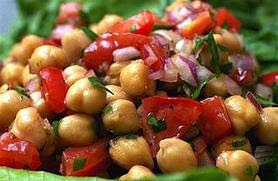It’s easy to get enough protein without eating animals, but the doubters often have another concern: Are these meat-free protein sources complete?
How much protein do we need? The RDA recommends that we take in 0.8 grams of protein for every kilogram that we weigh (or about 0.36 grams of protein per pound that we weigh).
How much protein do we need? The RDA recommends that we take in 0.8 grams of protein for every kilogram that we weigh (or about 0.36 grams of protein per pound that we weigh).
 |
| Add caption |
This recommendation includes a generous safety factor for most people.The term "complete protein" refers to amino acids, the building blocks of protein. There are 20 different amino acids that can form a protein, and 9 that the body can’t produce on its own. These are called essential amino acids —we need to eat them because we can’t make them ourselves. In order to be considered “complete,” a protein must contain all nine of these essential amino acids in roughly equal amounts.Yes, meat and eggs are complete proteins, and beans and nuts aren’t. But humans dont need every amino acid in every bite of food in every meal they eat; we only need a sufficient amount of each amino acid every day Most dieticians believe that plant-based diets contain such a wide variety of amino acid profiles that vegans can get all of their amino acids with very little effort
| FOOD | AMOUNT | PROTEIN | PROTEIN |
| (gm) | (gm/100 cal) | ||
| Tempeh | 1 cup | 31 | 9.6 |
| Soybeans, cooked | 1 cup | 29 | 9.6 |
| Seitan | 3 ounces | 21 | 17.5 |
| Lentils, cooked | 1 cup | 18 | 7.8 |
| Black beans, cooked | 1 cup | 15 | 6.7 |
| Kidney beans, cooked | 1 cup | 15 | 6.8 |
| Chickpeas, cooked | 1 cup | 15 | 5.4 |
| Pinto beans, cooked | 1 cup | 15 | 6.3 |
| Lima beans, cooked | 1 cup | 15 | 6.8 |
| Black-eyed peas, cooked | 1 cup | 13 | 6.7 |
| Veggie burger | 1 patty | 13 | 18.6 |
| Veggie baked beans | 1 cup | 12 | 5.0 |
| Tofu, firm | 4 ounces | 11 | 10.6 |
| Tofu, regular | 4 ounces | 10 | 10.7 |
| Bagel | 1 med. (3.5 oz) | 10 | 3.9 |
| Quinoa, cooked | 1 cup | 8 | 3.7 |
| Peas, cooked | 1 cup | 8 | 6.6 |
| Textured Vegetable Protein (TVP), cooked | 1/2 cup | 8 | 15.0 |
| Peanut butter | 2 Tbsp | 8 | 4.1 |
| Veggie dog | 1 link | 8 | 13.3 |
| Spaghetti, cooked | 1 cup | 8 | 3.7 |
| Almonds | 1/4 cup | 8 | 3.7 |
| Soy milk, commercial, plain | 1 cup | 7 | 7.0 |
| Whole wheat bread | 2 slices | 7 | 5.2 |
| Almond butter | 2 Tbsp | 7 | 3.4 |
| Soy yogurt, plain | 8 ounces | 6 | 4.0 |
| Bulgur, cooked | 1 cup | 6 | 3.7 |
| Sunflower seeds | 1/4 cup | 6 | 3.3 |
| Cashews | 1/4 cup | 5 | 2.7 |
| Spinach, cooked | 1 cup | 5 | 13.0 |
| Broccoli, cooked | 1 cup | 4 | 6.7 |
| Sources: USDA Nutrient Database for Standard Reference, Release 24, 2011 and manufacturers’ information. The recommendation for protein for adult male vegans is around 63 grams per day; for adult female vegans it is around 52 grams per day It is very easy for a vegan diet to meet the recommendations for protein. Nearly all vegetables, beans, grains, nuts, and seeds contain some, and often much, protein. Fruits, sugars, fats, and alcohol do not provide much protein, so a diet based only on these foods would have a good chance of being too low in protein. However, not many vegans we know live on only bananas, hard candy, margarine, and beer. Vegans eating varied diets containing vegetables, beans, grains, nuts, and seeds rarely have any difficulty getting enough protein as long as their diet contains enough energy (calories) to maintain weight.
What about combining or complementing protein? Doesn’t that make the protein issue much more complex? Let’s look at a little background on the myth of complementing proteins. Protein is made up of amino acids, often described as its building blocks. We actually have a biological requirement for amino acids, not for protein. Humans cannot make nine of the twenty common amino acids, so these amino acids are considered to be essential. In other words, we must get these amino acids from our diets. We need all nine of these amino acids for our body to make protein.
Some people say that eggs, cow’s milk, meat, and fish are high quality protein. This means that they have large amounts of all the essential amino acids. Soybeans, quinoa (a grain), and spinach also are considered high quality protein. Other protein sources of non-animal origin usually have all of the essential amino acids, but the amounts of one or two of these amino acids may be low. For example, grains are lower in lysine (an essential amino acid) and legumes are lower in methionine (another essential amino acid) than those protein sources designated as high quality protein.
We recommend eating a variety of unrefined grains, legumes, seeds, nuts, and vegetables throughout the day, so that if one food is low in a particular essential amino acid, another food will make up this deficit
For more articles stay right here on www.bhumicka.com
| |||


